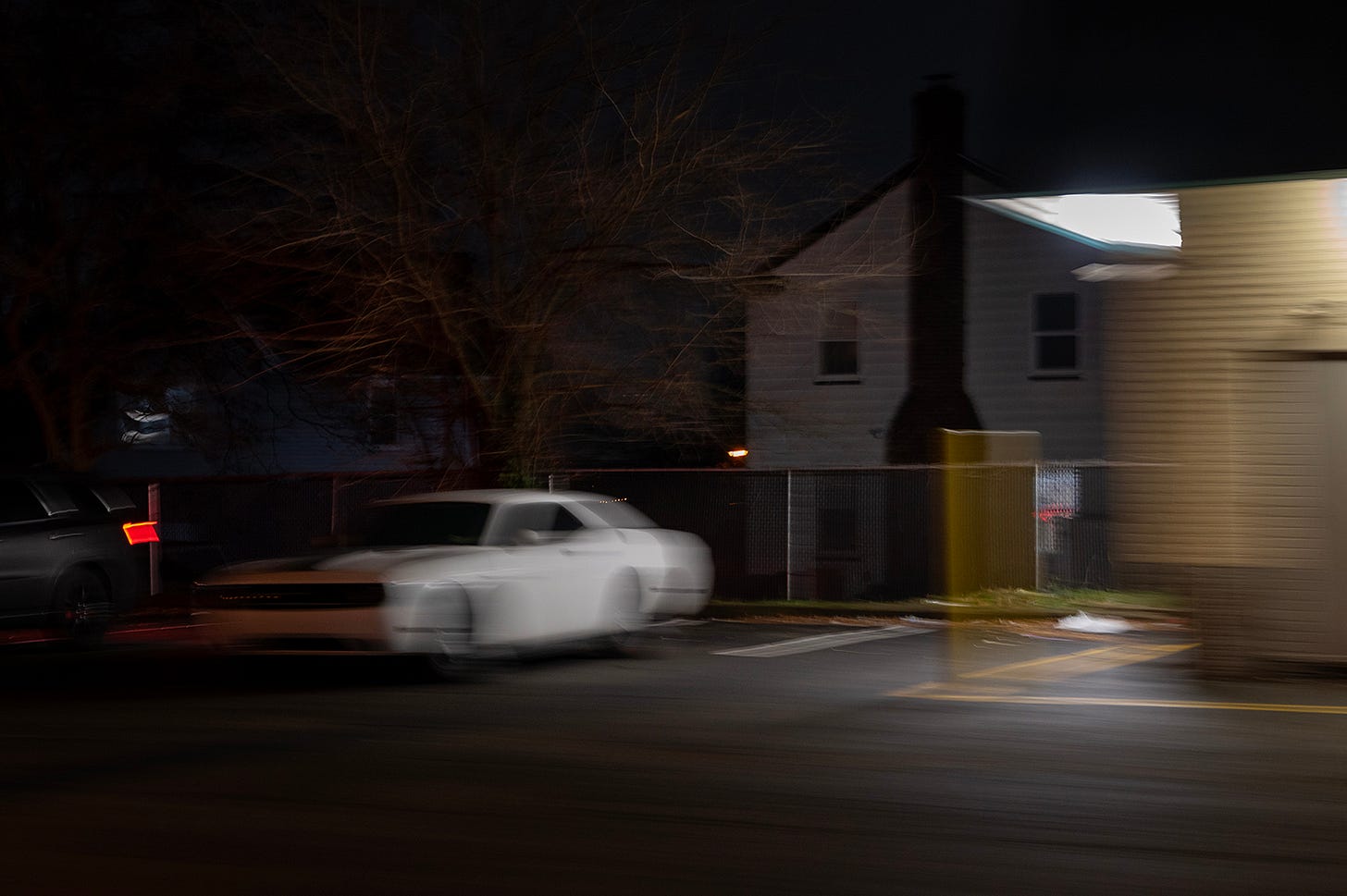I stood in the street in Kansas, trying to understand why my house looked wrong. The windows were black. The wraparound porch, when I left a couple hours earlier, had been outlined with the glow from the little white Christmas lights, but now the side I was facing, the west side of the house, was dark.
The streetlamp across Main Street cast a pale sideways light over the porch steps and glinted strangely, reflecting off thousands of pieces of glitter. It looked like glitter, but that didn’t make sense.
The cats were walking ahead of me, toward the house. I stood in the street, not moving, trying to understand. Slowly, my eyes adjusted, and I realized: the thick dark silhouette of something thrown down over the steps. A strand of torn Christmas lights dangling, swaying over the entry, as a light breeze picked up. The clear bulbs caught the light from the streetlamp. Below, the glitter blew across the concrete step.
Glass. Not glitter. It was broken glass. I called out suddenly, screaming, for the cats to come back.
I hadn’t been away for very long. I’d left the house a couple hours earlier for dinner across the street with the neighbors. My neighbor and friend Terry had taken on the role of mother for me the past two days—feeding me, checking in on me—given that my own mother was 1500 miles away and waiting for me to fly to meet her in California. While I was packing my bags that afternoon, Terry called and asked if I’d eaten. She knew I had been in the house alone all day, backing up my files and gathering my things to travel. I’d spent the day walking through my home looking at everything as if I would never see it again, choosing only the most precious things to take with me.
My husband had been there in the morning. He made a scene, left, then came back and made a bigger scene. Finally, he’d driven away. He had a travel bag with him and a gun. He left me with the words, “When they find me, you’ll know.”
I would know. I did know. I already knew.
Now I stood in the street and looked again at the dark windows behind the porch. A couple hours earlier, when I left for Terry’s, I had turned the living room lights on. Now the house was dark. A couple hours earlier, I had left the cats inside. Now they were circling around my feet, waiting to see where I was going.
I fished the phone out of my coat pocket and called Terry.
“Terry? Terry, I think he’s waiting in there. He’s in the house.” My voice came out strangled.
“Come back.”
“The Christmas Tree. It’s—he’s thrown it out the door. There’s glass everywhere.”
“Tonya. Come back right now.”
I called the cats and we walked back to Terry’s house. I sat on her couch sobbing while she called the police for me.
Two policemen came. They took my keys and left to search my house. Later, they returned and said they’d found him. He was alive and mostly lucid, staying at the apartment we’d built in an old building downtown. Yes, he admitted, he’d been at the house earlier in the evening. He had gone there to talk to me. When I wasn’t there, he became angry and, yes, he had decided to get rid of our Christmas tree.
They pointed out to him that it wasn’t just the tree. Had he torn down the lights on the porch? Yes. And, as they’d searched the house, they’d seen things thrown all over the living room and the kitchen. There were broken things all over the place. That was him? He was annoyed by these questions. As fellow men, he felt, they should understand. When your whole world is being stolen from you, it’s easy to overreact. He agreed he’d overreacted. He regretted it now. But he hadn’t hurt anyone. He wasn’t going to hurt anyone.
And he wasn’t hiding anything. Yes, he had a gun with him. He carried it in his travel bag for protection. They had no right to take it away from him. Whatever they’d heard from me, it wasn’t the big deal I was making it out to be. He knew he had said some dramatic things to me earlier, but only in hopes of reminding me how much I loved him.
If she really thought I was going to commit suicide, he asked, shouldn’t she have come herself to find me? Shouldn’t she have talked to me, instead of calling the police? Would you call the police on your wives? Is that what you would do to the person you’re supposed to love more than anyone?
Recounting the conversation to me, the policeman was clearly uncomfortable.
My husband was sorry they’d been called out for nothing. He hoped this hadn’t taken up too much of their night.
The next morning, another policeman stood out on my lawn as I cleaned up the broken things in the house and poured extra cat food into bowls on the kitchen floor. Terry had carried my computer over to her place for safekeeping. Her daughter Jana was on the porch, sweeping the glass into a big trash bag and gathering the ornaments that weren’t broken.
I was in the living room, mopping up the last of the water from the overturned tree stand, when I heard the car pull up outside.
As he saw me come out to the front porch, he walked across the front lawn, ignoring the police officer. He began to yell.
He stood in our yard and, at the top of his lungs, he broke everything he hadn’t already broken: my trust, any faith I had ever placed in him. He screamed about my life. My family. If I wrote down all the things he yelled, I would have to hear them again, and I never want to hear them again. I’m only bringing up the scene at all because, finally, in the last minute before the cop coerced him back into his car, he returned to a tune I recognized.
“You did this,” he yelled from the curb. “You did all of this. I was a good husband. You did this.”
I did this. I made this all happen.
I’m mentioning it because it’s the one point where he and I agree.
I may be the villain of his story. There’s a good case to be made, and I’ve been waiting to hear someone make it. Even my ex-husband wouldn’t make that case, though you’d think he would be the one person. He would tell you that I destroyed him, but he wouldn’t say it was my fault. And that’s not just because he’s dead now and no longer typing on his computer late into the night, assembling meticulously researched cases against his enemies.
He never believed I was responsible for what I’d done to him.
It never made sense to him. None of it. I was the perfect wife, and then I was gone. I was loving and generous for a decade, then went silent. I took on all his problems as my own. I was completely there for him, and then I wasn’t. Nothing could account for it.
Something must have happened to me. To pack my bags one day and get on the airplane in Wichita, to hire an attorney and leave everything behind me. I must have been under the sway of some malicious influence. He wondered whether it was some fundamental breakdown in my personality. Or was it the influence of my mother? Possibly it was a latent urge held over from the MeToo movement or else the unsettled spirit of the pandemic era. He kept saying that one of two things was true: either something had happened to me or else I wasn’t the person he thought he knew. Either (1) I was brainwashed or going through some psychotic break that rendered my behavior incomprehensible, or else (2) I was the greatest liar he’d ever known.
Each time he wrote out those options, in texts and emails after I left, he made it clear to me he’d already decided it was the former. Never the latter. What had happened to me? What had changed me? I had been perfectly happy, and then, out of nowhere, I wasn’t.
“Everyone could see how in love you were,” he wrote to me. Trying to convince me. “They could see it in your eyes.”
He was determined to find out what had happened to me. But he never could figure out what it was.
No one else will build a case against me, so I assemble it myself, in spare moments, or in the middle of the night, after a nightmare.
I was a liar. I lied to him for years. For the entire stretch of our relationship.
“I thought you loved me,” he wrote to me after I had landed in California. “Did you really hate me the whole time?”
“I do love you,” I wrote back. “I can’t be married to you anymore, but I have always loved you.”
I wanted to be able to look back on my divorce and not regret a single thing I’d said or done. And though I kept my calm with him partly out of fear—I was still afraid he might follow me to California with a gun—it was also the truth. Or it was a kind of truth. I didn’t want to take away all his good memories. I wanted him to remember the good things, and then to let our marriage end and move on.
I wasn’t going to be one of those women who left her husband and then angrily said, “I never loved you,” like a line in a movie. I knew his first wife had said that to him after she left him, and then he carried it around forever, along with all the other slights and betrayals. I wasn’t going to give him anything like that.
But I lay awake at night in California revisiting two moments in particular.
First, back at the very beginning. In early 2010, when I was still the unsettled writer/waitress who couldn’t make up her mind about graduate school, and he was the sarcastic, adventurous publisher, freshly home after another long trip to Australia. We had been emailing for months by the time I first arrived at his house in Utah. And he had been pestering me to say I loved him the whole time we’d known each other. He’d been saying it to me from the beginning, from thousands of miles away. It came up in our phone calls in the weeks before I arrived. And each time, I told him the same thing.
“No. It means something to me to say, ‘I love you.’ I don’t want to just say it. I want to know that it’s true.”
I drove from California to meet him on March 10, 2010. It was fourteen years before his death. (Now I wonder if there was a ghost with us each year when we celebrated that anniversary. Just a shiver, a slight preapprehension of what would come later.)
We spent that night together, and in the morning, he brought it up again. Didn’t I know now? I didn’t.
We were together for weeks, driving around Canyon Country. I cooked for him. He showed me movies he wanted me to watch. I got friendly with his two old cats. One weekend, we drove down to Arizona and camped in the desert.
That night, we had been drinking. And, within minutes of taking his nightly Ambien, he was upset. What was wrong with me? All of his other girlfriends over the years had loved him. They all said it. There were women right now who loved him, and maybe he should leave me and find one of them. This was bullshit, he decided, this thing where I needed to deliberate for months before deciding whether or not I loved somebody. Either I did or I didn’t. I needed to decide, he said.
I spent a long time staring up at the ceiling of the dark tent.
We were miles from the nearest town, and all I could think about was how badly I wished I were in that town now—any town, anywhere else on the planet—and not here, in a claustrophobic two-person tent in the middle of the desert with this man who, as the pill kicked in, was beginning to slur his words beyond comprehension.
I don’t, I said to myself, as he finally fell into the blank, dreamless, Ambien sleep. If it has to be a yes or no thing, then it’s no. I don’t.
We drove 300 miles back to Utah in silence. Another couple weeks passed. Our first two fights. The seeds of a third. And when I did say “I love you” to him, finally, it wasn’t because I had changed my mind. I was just tired. I was sick of having the conversation.
The second moment I would replay—late on those sleepless nights after I left him, lying in the basement apartment at my mother’s house—was from April of 2011, a year after the tent in Arizona. My father had died a few months earlier. We had moved to Kansas and we were engaged to be married in the fall. It was a sunny, hot day. And my fiancé, not-yet-husband, was out of town, visiting his cabin in Utah.
I was suffering from a restless kind of day, walking from room to room through the house. Nothing around me felt right. The paint colors on the walls—I was the one who chose them, but I knew they just didn’t work. The yellow living room was the wrong yellow. The coral shade in the bedroom looked more like orange sherbet. And pressed up against the ugly paint colors was all this stuff I didn’t recognize. Everything, all the furniture, was his. All brought from his house when we moved from Utah to Kansas. The art on the walls. The rugs on the floor. All the kitchen tools and the knicknacks on tables.
It wasn’t his fault. I didn’t have anything. Everything I’d owned before I met him had fit in the rear cabin of my 1996 Toyota 4Runner when I drove it from California to Kansas. In the house, my things filled half a closet, a small chest of drawers, and one bookshelf. We were already planning to sell my car. And together, for the house, he and I had purchased two brand new things—a big, cushy leather couch that turned out to be too big and cushy for comfortable sitting. It was more like a bed. And a new mattress for our bedroom that we realized, almost immediately, was too firm for sleeping.
I moved through the house like a visitor, unable to get comfortable. My mind was unsettled. I couldn’t sit easily on the enormous, cushy couch. I didn’t yet have a place in the house where I liked to write. I tried out one room, then another, until at one point I arrived in the bathroom and caught myself in the mirror.
Something about what I saw in the mirror stopped me. Something about the look on my face.
I don’t want this.
I left the room. I didn’t want to hear this from myself. Not now. What was I supposed to do? I had already told everyone the date of the wedding. I had moved to Kansas with him. It was impossible to disentangle myself from everything I’d set into motion.
But I don’t want this.
I carried the thought to the bedroom and lay back with it on the hard bed. I tried to picture how everything in my life could be undone. I could pack my things into the 4Runner. I could drive back to California. I pictured him standing over me as I packed the bags. I pictured him standing in the doorway as I left.
I imagined his face, his response if I told him I was leaving. I could hear him already. “We moved here for you. I bought this house for you. I gave you everything you wanted, and now you’re just going to walk away and leave me with it?”
It is entirely possible to know something is true, to see its truth with full clarity and certainty, and then do nothing. To allow the truth to change nothing. I knew I wanted to leave that day in 2011. But, in order to leave, I would have needed to call him while he was at the cabin in Utah and tell him. The cabin in Utah, where he’d already tried to kill himself once, after an earlier, failed relationship. I knew I couldn’t make that phone call. For a day or two, I walked around the house in a kind of shell shock. Not sure whether to make plans or to un-make plans. Then, as days passed, I fell back into my daily patterns. By the time he came home, the knowledge had hardened into a little stone, something small enough to carry around.
One evening, not long after he came home from Utah, I did tell him I was having a hard time planning the wedding. I was still grieving for my dad. I told him it was painful to imagine my wedding without my father there.
He was immediately hurt. Upset. “Now you don’t want to get married? Fine, we won’t.”
I started to walk it back. “I’m not saying I don’t want to. I just had always imagined that my dad would be with me when I got married. It’s hard to picture that day without him.”
“If the thought of getting married makes you so sad, then you shouldn’t get married. I don’t want to marry somebody who gets sad when they think about marrying me.”
“That isn’t what I’m saying.”
What was I saying? I couldn’t remember anymore. I just wanted the fight to be over.
“I can’t believe you’re just coming up with this now, completely out of the blue.”
In the end, I begged him to marry me. I begged him.
Remembering it, even now, I put my hands over my face.
What was wrong with me? I acted against myself, over and over. To avoid his anger, to avoid the eerie silence, the pills, the punishments. To avoid finding out whether he was as close to the edge of suicide as he often claimed to be. I was afraid—of what? Of tipping the pendulum just a hairsbreadth too far and committing an irreversible act. I was afraid of something I couldn’t even name. Whatever I feared, it was threatening enough that I kept quiet. Threatening enough that I would un-say anything, no matter how true.
I wouldn’t leave, no matter how richly I dreamed about another life. No matter how many times he angrily walked out on me, told me to leave, pushed me away. I knew when I was being tested, and each time I was determined to pass the test. Through battle after battle, I proved myself to him. I fought desperately to keep a status quo that made me sick and angry. I got hurt and then I recovered, and then I waited to be hurt again. And then I put a smile on my face. I laughed at the funny things he said. I listened to his stories.
I said, “of course,” each time he asked if I still loved him.
All the lying, all the words I bit back over the years—I filled up a storeroom with words, and with resentments and dark memories I couldn’t write down. Sometimes, as I was washing dishes in the sink, all the fury in my head would boil over until I was crying. For no obvious reason. I preferred to cry in the kitchen. If I could have stopped myself from crying, I would have. If he saw me cry, it was always a fight. But when I couldn’t stop it, I would push down harder on the wound and hurry as quickly as possible into the swell of pain so that I could get to the other side. I would clean up my face and tuck the thoughts away before I left the kitchen.
He didn’t know. He wasn’t wrong to be confused. He didn’t know how I felt. I understand that he didn’t know.
When I make the case against myself, I curse myself for the lying. I tell myself that if I hadn’t been such a liar, we wouldn’t have lasted a month. If I had just been willing to face the consequences of being honest. If I had ever said what I felt, then none of it would have happened. Years and years of my life. Something else would have happened, but not this. Not the way it played out.
Last March, I got the call from the sheriff in Kansas. When I got off, I waited for my brain to kick in, to tell me what I should do next. Then I called my mother to tell her what had happened.
“Oh no,” she said. “Oh no.” I could hear her voice breaking. “Don’t, even for a second—do not blame yourself for this, Tonya,” she said. “You didn’t do this.”
I called my sister. “You know this isn’t your fault, Tonya. It sounds like he was headed this direction for—”
“A long time,” I said. “He was.”
As the news of his suicide filtered through his circle of friends and readers, I began to get messages and phone calls. The kinder ones all said the same thing.
“I hope you aren’t blaming yourself.”
“This has nothing to do with you, Tonya. This isn’t because you left him.”
“I know,” I replied, over and over.
In those early weeks, I wasn’t ready to tell anyone the significance of the date he’d chosen. They didn’t need to know he’d left an envelope on the table with my name on it. Inside was an SD card with a video for me to watch once he was gone. I managed to get through half the video before I had to turn it off.
Was I responsible for his death? No one wants to say so. At least, not to my face.
Even me. I don’t want to say it. As I draw nearer to the thought, I can hear the whole chorus of voices telling me otherwise. The voice of the therapist I saw after the divorce. “What makes you think you’re powerful enough to make someone live or die?” The voices of my mother, my boyfriend Paul, my friends—
I know, I know. You can all stop saying it. I hear all of you. All the clear, healthy reasoning. I’m not arguing. I know I couldn’t do otherwise. Couldn’t keep sacrificing myself, every ounce of my energy, just to keep him alive. I know I couldn’t keep shrinking smaller under the weight of him and everything he needed from me. I can hear everyone I love holding me back from that black, uncomfortable thought. But…
There’s still a place in me those voices can’t reach. Some older, inarguable place, where his voice lives. Burned somehow deeper in me than those other voices.
“You always knew I couldn’t live without you,” he says.
And what can I say to that? Yes, I knew.
Tonya Morton is, among other things, the publisher of Juke.
Note: I called this “Part One” even though the second part of the piece isn’t finished. So, instead of leaving you with “Part Two on Friday”, I’m just gonna wave vaguely at the calendar and we’ll see what happens.
If you enjoyed this post, hit the ♡ to let us know.
If it gave you any thoughts, please leave a comment.
If you think others would enjoy it, hit re-stack or share:
If you’d like to read more:
And if you’d like to help create more Juke, upgrade to a paid subscription (same button above). Otherwise, you can always help with a one-time donation via Paypal or Venmo.









He was a very sick man and a master manipulator. That's what sociopaths do. They turn everything you say toward themselves. They make everything you say about them. I'm glad you were finally able to extract yourself from a toxic relationship.
Thanks, Tonya. You make this kind of writing look easy. It’s not.